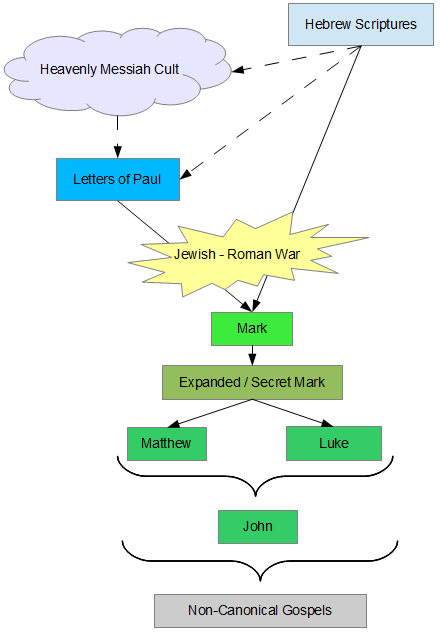MrMacSon wrote:Sheshbazzar wrote: While the text of Deut 18:18-19 refers directly to the Prophet at hand " Ἰησοῦς , the son of Nun", it was long conceived among Hellenistic LXX Bible scholars that this " Ἰησοῦς" ('Joshua' <sic> 'Jesus') was only a 'TYPE' and a forerunner of that " Ἰησοῦς the Χριστός >"Christus" that was to come.
The telling detail of the NT is that The Annunciation made to the Hebrew/Jewish nation was considered (by the writers) to require no explanation of any of the foreign Greek terminology being employed.
" Ἰησοῦς " <sic> 'Jesus' the Χριστός >"Christus" Redeemer had been an integral part of Hellenistic Judaic thought and teaching all the way back to the initial production of the Septuagint (LXX) text circa 200 BCE !
(The afterthought of providing a Hebrew to Greek translation of the foreign sourced Greek term 'christos' does not arrive until as late as the composition of 'The Gospel According to John' (Jn 1:41 & 4:25)
The Hellenistic Greek speaking gospel writers, fully indoctrinated into the Greek LXX terminology, expected everyone of that time and place (including native Aramaic and Hebrew speakers) to already be familiar with their Greek 'EaSUS 'Christus', an expectation that could not be so lightly taken for granted, UNLESS their 'EaSUS as 'Christos' terminology and doctrine had been preached and expounded upon for a long period preceding the Annunciation.
I'm intrigued by John 7:41 -
John 7
- 40 On hearing his words, some of the people said, “Surely this man is the Prophet.”
41 Others said, “He is the Messiah.”
42 Still others asked, “How can the Messiah come from Galilee? 42 Does not Scripture say that the Messiah will come from David’s descendants and from Bethlehem, the town where David lived?”
43 Thus the people were divided because of Jesus
.
I should comment on this as your quoted example text
transforms or 'translates' the
Χριστός of the actual Greek text
back into the Anglicized form/spelling 'Messiah' derived from the Hebrew term
משיח '
mashiyach ' pronounced 'ma'shee'kah' . Which has been a major point of the preceding arguments.
Here is John 7:41 of the Greek manuscript with the (offending) term highlighted
40. πολλοὶ οὖν Ἐκ τοῦ ὄχλου ἀκούσαντες τὸν λόγον, ἔλεγον Οὗτός ἐστιν ἀληθῶς ὁ προφήτης
Many of the people therefore, when they heard this saying, said, Of a truth this is the Prophet.
41. ἄλλοι ἔλεγον Οὗτός ἐστιν ὁ Χριστός ἄλλοι δὲ ἔλεγον Μὴ γὰρ ἐκ τῆς Γαλιλαίας ὁ Χριστός ἔρχεται
Others said, This is the Christ. But some said, Shall the Christ[/b ] come out of Galilee?
42. οὐχὶ ἡ γραφὴ εἶπεν ὅτι ἐκ τοῦ σπέρματος Δαβίδ, καὶ ἀπὸ Βηθλέεμ τῆς κώμης ὅπου ἦν Δαβίδ, ὁ Χριστός ἔρχεται
Has not the Scripture said that the Christ comes from the seed of David and from the town of Bethlehem, where David was?”
43. σχίσμα οὖν ἐν τῷ ὄχλῳ ἐγένετο δι᾽ αὐτόν
So there was a division among the people because of Him.
There was a natural division among the people because of the
terminology.
It is not as though the Greek language or writing is
incapable of providing the ancient Hebrew religion, Scriptural sourced 'official' title Messiah,
when the writers wish to (it
IS written, and appears in the Greek as
Μεσσίας "Messias" in John 1:41 and 4:25)
The writers of John 1:40-42
could have just as easily written;
40. πολλοὶ οὖν Ἐκ τοῦ ὄχλου ἀκούσαντες τὸν λόγον, ἔλεγον Οὗτός ἐστιν ἀληθῶς ὁ προφήτης
Many of the people therefore, when they heard this saying, said, Of a truth this is the Prophet.
41. ἄλλοι ἔλεγον Οὗτός ἐστιν Μεσσίας ἄλλοι δὲ ἔλεγον Μὴ γὰρ ἐκ τῆς Γαλιλαίας Μεσσίας ἔρχεται
Others said, This is MESSIAH. But some said, Shall MESSIAH come out of Galilee?
42. οὐχὶ ἡ γραφὴ εἶπεν ὅτι ἐκ τοῦ σπέρματος Δαβίδ, καὶ ἀπὸ Βηθλέεμ τῆς κώμης ὅπου ἦν Δαβίδ, Μεσσίας ἔρχεται
Has not the Scripture said that ΜESSIAH comes from the seed of David and from the town of Bethlehem, where David was?”
43. σχίσμα οὖν ἐν τῷ ὄχλῳ ἐγένετο δι᾽ αὐτόν
So there was a division among the people because of Him.
There was. (and there
still is) a division among the people because of the
terminology, as well as the nature of the (fictional) person being discussed
By employment of the Greek "Christus" these Hellenist were deliberately
excluding and making an end run around Hebrew/Aramaic speaking Jews and traditional Jewish Messianic interpretation belief and believers.
Sheshbazzar wrote:
The historical explanation requires no actual life of any flesh and blood human 'Jesus' as its Beginning. Everything written about the infamous 1st century CE 'Jesus' is composed of fiction built on top of the fictions of the Tanakh, as corrupted into Greek.
